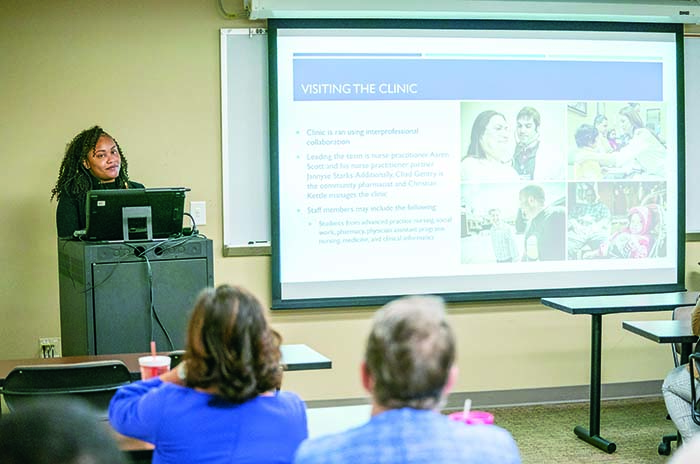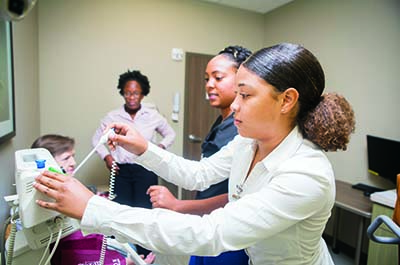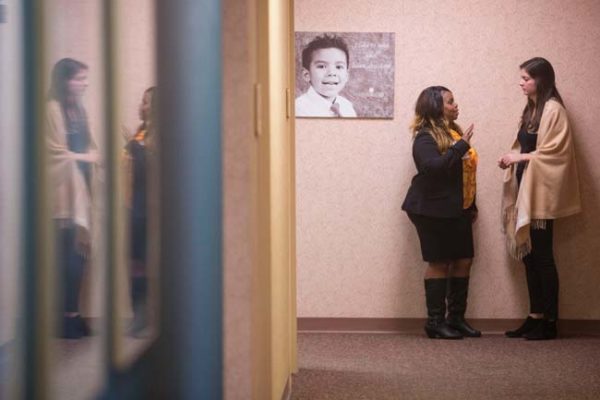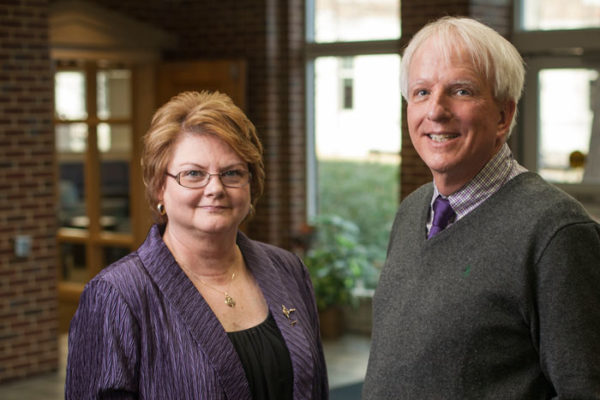Partnership for diversity

Clark Atlanta University junior ShaVaughn Thomas admits she knew little about nurse practitioners and their role in patient care, but after taking part in an intensive, hands-on summer program at Vanderbilt University School of Nursing, she not only knows what advanced practice nurses do, she has great respect for their contributions.
“Coming into the program, I was ignorant about the whole field of nursing,” said Thomas, who is planning to go to medical school. “Learning about nurse practitioners really sparked my interest. I thought if I ever do change my mind and consider the field of nursing, I know it would be to become a nurse practitioner.”
Nursing schools in the United States continue to face the challenges of drawing a diverse student mix that more closely mirrors the ethnic, cultural and socioeconomic backgrounds of the patients coming through the doors of clinics and hospitals. VUSN is addressing these challenges in part through the Morehouse School of Medicine (MSM) Undergraduate Health Sciences Academy (UHSA), a successful summer program that is earning rave reviews from participants.
“This summer program is so important as we continually strive to increase diversity in nursing, something that remains a challenge for schools of nursing throughout the United States,” said Linda Norman, DSN, FAAN, Valere Potter Menefee Professor of Nursing and Dean of Vanderbilt School of Nursing. “Participants walk away with an appreciation for what’s involved in health care delivery as a whole. Because of the types of clinics we put them in, they come to understand the intricacies of health care disparities and underserved populations, regardless of race. And they figure out what advanced practice nurses do and what contributions they make to health care delivery.”
Reaching students early while they’re still charting their career paths is critical, she said.
“If you get to them early, it opens their eyes, and they realize there are opportunities other than med school. They learn not just what advanced practice nursing is, but also about the other options for health professionals, whether it be psychology, social work or other specialty practices.”
Partnering with Historically Black Colleges and Universities
Thomas was part of the 2019 cohort in UHSA, a program for undergraduates from historically black colleges and universities (HBCU) contemplating health care careers. The six-week program hosted by VUSN spotlights the complex roles of nurses in interprofessional care teams.
The students’ time in Nashville included hours spent closely shadowing nurses at inpatient and outpatient clinical settings as well as participating in classroom and simulation lab instruction led by a diverse roster of educators. At the program’s conclusion, each student presented a capstone project fueled by his or her summer’s learning.

Paris Grady makes her capstone presentation on the Clinic at Mercury Courts at the conclusion of her externship. Photo by John Russell.
VUSN, which welcomed participants for the second year in 2019, is the only school of nursing collaborating with MSM on this program, joining more than two dozen other health care-related partners throughout the United States. Establishing strong and meaningful partnerships between VUSN and HBCUs to better diversify the nursing workforce has long been a top priority, Norman said. In the past, VUSN has partnered with Morris Brown College, an HBCU in Atlanta, and with Nashville’s Fisk University.
In 2016, Norman found herself seated beside Valerie Montgomery Rice, MD, president and dean of the Morehouse School of Medicine, when both women were named to serve on The Nemours Foundation Board of Directors. Nemours is a multistate children’s health system with two hospitals and more than 60 specialty, primary and urgent care clinics.
“I asked her, ‘Can you help me figure out who to talk to at Morehouse College and Spelman so we can establish relationships with them?’”
Montgomery Rice immediately countered with her own question: Would VUSN consider participating in UHSA at Morehouse School of Medicine?
UHSA accepts underrepresented students from the Atlanta University Center Consortium (AUCC), which includes Clark Atlanta University, Morehouse College and Spelman College, all HBCUs in the Atlanta area. Eligible students must have a declared major in science, technology, engineering, math or art, and an interest in health care or biomedical sciences. With a goal of advancing and ensuring the success of future diverse health care providers, UHSA provides summer externships and shadowing opportunities at health care organizations throughout the United States.
“I said, ‘Absolutely!’” Norman remembered. “In January 2018, they invited me to come talk to Undergraduate Health Sciences Academy participants, and that summer we hosted six students here. This is a great way for us to link with three HBCUs, and we look forward to continuing this wonderful relationship.”
Eye-opening rotations
The first year VUSN participated, Tamika Hudson, DNP, MSN’12, assistant professor of Nursing, coordinated the UHSA program at Vanderbilt. The second year, Shaunna Parker, MSN’11, instructor in Nursing, and Julia Steed, PhD, MSN’10, assistant professor of Nursing, shared coordination duties.

Metro Nashville Public Schools health clinic patient Robbie Fowler waits to have her temperature read by UHSA student Leigha Mills. She and fellow student D’Asia Holloway (background) were members of the first year’s cohort. MNPS staffer Kelly Lett, LPN (center), supervises. Photo by Susan Urmy.
During the program, the undergraduates interacted with a variety of health care professionals, many of whom were also HBCU graduates, learning about their specific career paths and roles. Students also shadowed clinicians at Monroe Carell Jr. Children’s Hospital at Vanderbilt and Vanderbilt University Adult Hospital in clinical spaces that included the emergency department, cardiac step-down unit, orthopaedics and neurology.
Outpatient clinical shadowing was designed to expose students to diverse patient populations. Students shadowed at Metro Nashville Public Schools’ Employee and Family Health Centers, sites run by VUSN family nurse practitioners to provide care for school system employees and their families; at the Clinic at Mercury Courts, a nurse-managed primary care clinic in one of Nashville’s most economically depressed areas; and at West End Women’s Health Center, a clinic run by Vanderbilt nurse-midwives and primary care nurse practitioners.
For Paris Grady, a junior at Clark Atlanta University, the summer course didn’t change her intention of becoming a physician, but the clinical rotations did spur deeper thought about her plans. She loved watching the clinicians at Children’s Hospital, so she’s leaning toward pediatrics now. Her outpatient clinic experience at the Clinic at Mercury Courts opened her eyes to the value of a close-knit, collaborative clinical practice.
“I would be more willing to work in a clinic rather than a hospital after I finish med school,” she said. “I liked how all the clinicians knew the patients who were coming in and how they took their time to explain things and make sure everyone was getting exactly what they needed. In the clinic, everything was more comfortable, whereas the hospital setting seemed more fast-paced.”
Skill building for health care
“This has been an incredible opportunity for everyone involved,” Parker said. “It’s amazing to see the growth in undergraduates from the beginning until the point when they’re giving their capstone presentations. As for myself, being a part of this makes me want to be even more involved in helping students who are underrepresented.”
Steed agreed, and added that regardless of whether or not students decided to pursue nursing as a career, participants gained skills they could use in any health profession they chose.
“In addition to clinical exposure, we also taught a lot about evidence-based practice and research,” Steed said. “The students’ final assignments were research projects they created from beginning to end. That’s knowledge that can definitely be transferred to any health care profession.”
UHSA Executive Director and Assistant Dean for Pipeline Programs Rahmelle Thompson, DVM, said the experience the college students gain through the partnership with VUSN is invaluable.
“Many of the students have certainly heard of Vanderbilt, but to actually attend a summer program that is as hands-on as this session provided by the Vanderbilt University School of Nursing is remarkable,” Thompson said. “I have 90 students in our Undergraduate Health Sciences Academy, and if I could have every student attend this summer program at Vanderbilt, I would.”






